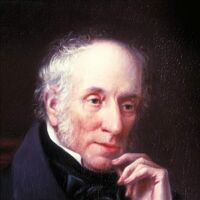
The Rainbow
“My Heart Leaps Up,” remarkable in itself, is also the seed of the great Ode: Intimations of Immortality from Recollections of Early Childhood, where Wordsworth employs as an epigraph the last three lines of this fragment (if it is that). “My Heart Leaps Up,” remembering that Noah's covenant with Yahweh was symbolized by the rainbow, employs the rainbow to celebrate another covenant, the continuity in Wordsworth's consciousness of self. Certainly this little poem is simple both in structure and in language, but the reader can come to uncover some perplexities in it. The child's ecstatic rainbow is primary, almost instinctive. “So is it now I am man” is necessarily secondary, since it depends upon memory of the child's joy. “So be it when I shall grow old” is clearly tertiary, since it depends both upon memory and the renewal of memory. The shock of the poem commences with “Or let me die!” Wordsworth does not wish to survive if his days—past, present, and future—cannot be “Bound each to each” in the double sense of bound as “connected” and as “bond” or covenant. “Or let me die!” testifies both to a potential despair and a desperation for faith, the belief in his own poetic election that Wordsworth perhaps misleadingly calls “natural piety,” by which he does not men the “natural religion” of the Enlightenment that opposed natural reason to revelation. William Blake, reacting to Wordsworth's misnomer, memorably snapped: “There is no such Thing as Natural Piety Because the Natural Man is at Enmity with God.”
Wordsworth's reply to Blake probably is implicit in the one line of “My Heart Leaps Up” we have not considered, the flat paradox “The Child is Father of the Man.” Sigmund Freud would have had little trouble with that formulation, but Wordsworth may mean by it a rather un-Freudian irony. Noah, seeing the rainbow, accepted it as the sign of the covenant: no more floods, and the blessing of more life on into a time without boundaries. Wordsworth, though he borrows the Yahwistic sign, intends the survival of his poetic gift, which depends upon the renewal of the child's joy. Memory, Wordsworth's great resouce, is also his source of poetic anxiety. He will have to go on questing for evidences of poetic election, which became very scarce after 1807, when he was just thirty-seven. Wordsworth lived another forty-three years, and wrote very bad poetry indeed, by the ream. His superb originality, and his subsequent decline, between them set the parameters for modern poetry.








